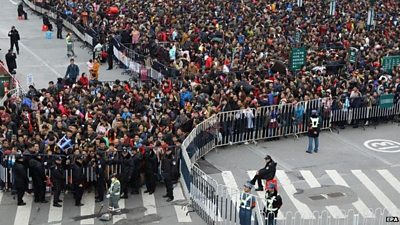Table of Contents
Recent Trends in Human Migration
The 21st century has witnessed significant shifts in migration patterns, influenced by a confluence of geopolitical, economic, and environmental factors. While traditional migration corridors remain active, new routes and destinations have emerged, reflecting evolving global dynamics. For instance, the rise of technology and globalization has facilitated labor migration, with skilled workers seeking employment opportunities in burgeoning industries across borders.
Causes of Human Migration
Understanding the root causes of human migration is essential for devising effective policies and interventions. Economic disparities, exacerbated by globalization, continue to drive millions of individuals to seek better livelihoods abroad. Political instability and conflict, particularly in regions such as the Middle East and Africa, compel people to flee their homes in search of safety and security. Additionally, environmental factors such as natural disasters and climate change increasingly contribute to displacement, forcing communities to relocate in response to ecological challenges.
Economic Reasons
In pursuit of economic prosperity, migrants often leave their homelands to access job opportunities and higher wages in destination countries. The promise of a better standard of living motivates individuals to endure the hardships of migration in hopes of securing a brighter future for themselves and their families.
Political Instability
Armed conflict, civil unrest, and persecution drive millions of people to flee their countries in search of refuge and asylum. The prevalence of conflict in regions such as Syria, Afghanistan, and South Sudan has led to one of the largest refugee crises in modern history, prompting neighboring countries and the international community to respond with humanitarian aid and resettlement efforts.
Environmental Factors
Climate change and environmental degradation pose existential threats to vulnerable communities, exacerbating resource scarcity and displacing populations from their homes. Rising sea levels, desertification, and extreme weather events compel individuals to migrate in search of safer and more sustainable living conditions, leading to complex challenges for policymakers and humanitarian organizations.
Impact of Human Migration
The influx of migrants has profound implications for both sending and receiving countries, shaping demographic, economic, and cultural dynamics in significant ways. While migration offers opportunities for economic growth and cultural exchange, it also presents challenges related to social integration, labor market competition, and resource allocation.
Economic Impact
Migrants contribute to the labor force of receiving countries, filling essential roles in industries such as agriculture, construction, and healthcare. Their labor often complements the skills and expertise of native workers, driving innovation and productivity growth. However, concerns about job displacement and downward pressure on wages persist, leading to debates over immigration policies and labor market regulation.
Social Impact
The cultural diversity brought by migrants enriches the social fabric of host communities, fostering cross-cultural understanding and tolerance. However, cultural differences may also lead to social tensions and xenophobia, particularly in societies experiencing rapid demographic changes. Promoting social cohesion and inclusivity through education and community engagement is essential for building resilient and harmonious societies.
Cultural Impact
mnweekly.com facilitates the exchange of ideas, traditions, and values, contributing to the cultural richness and diversity of societies. Through culinary traditions, music, art, and literature, migrants enrich the cultural tapestry of their host countries, creating vibrant multicultural landscapes. However, preserving cultural heritage and identity amidst rapid globalization remains a challenge, requiring proactive measures to safeguard intangible cultural assets and promote intercultural dialogue.
Challenges Faced by Migrants
The journey of migration is fraught with challenges and risks, from physical dangers to legal barriers and social discrimination. Migrants often face formidable obstacles as they navigate unfamiliar landscapes and bureaucratic systems in search of safety and opportunity.
Legal Barriers
Navigating the complex web of immigration laws and regulations can be daunting for migrants, particularly those fleeing persecution or conflict. Limited access to legal representation and asylum procedures may leave vulnerable populations at risk of deportation or detention, underscoring the importance of fair and transparent immigration policies that uphold human rights and dignity.
Language and Cultural Barriers
Adapting to a new language and cultural norms presents challenges for migrants as they strive to integrate into their host communities. Communication barriers can impede access to essential services such as healthcare and education, exacerbating social isolation and marginalization. Investing in language acquisition programs and cultural orientation initiatives can facilitate smoother transitions and foster greater social inclusion.
Access to Healthcare and Education
Migrants often face barriers to accessing healthcare and education services due to factors such as language barriers, legal status, and socio-economic disparities. Limited availability of culturally competent healthcare providers and educational resources further exacerbates disparities in health outcomes and academic achievement among migrant populations. Strengthening health and education systems to address the unique needs of migrants is essential for promoting equitable access to essential services and ensuring the well-being of migrant communities.
Government Policies and Responses
Governments play a critical role in shaping migration policies and responding to the needs of migrant populations. From border management to refugee resettlement, policy decisions have far-reaching implications for the rights and protections afforded to migrants and refugees.
Immigration Policies
The formulation and enforcement of immigration policies are influenced by political, economic, and social factors, reflecting national interests and priorities. Striking a balance between border security and humanitarian considerations poses a challenge for policymakers, who must navigate competing demands and interests while upholding international obligations and human rights standards.
Refugee Resettlement Programs
Refugee resettlement programs provide a lifeline for individuals fleeing persecution and conflict, offering them the opportunity to rebuild their lives in safe and stable environments. However, limited resettlement quotas and bureaucratic hurdles often prolong the resettlement process, leaving refugees in limbo and vulnerable to exploitation and abuse. Strengthening international cooperation and solidarity is crucial for expanding resettlement.













